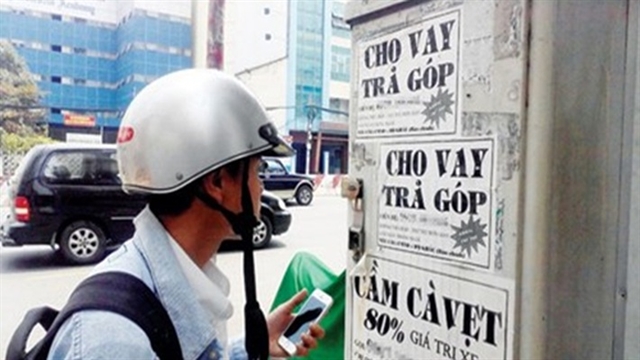 Economy
Economy


|
| Posters on a electrical board show details of unlicensed moneylenders. - Photo cafef.vn |
HÀ NỘI – National Assembly (NA) deputies on Wednesday suggested the Government should tighten the management of loan collections.
Deputy Bùi Thị Quỳnh Thơ from Hà Tĩnh said this was a normal because borrowers must pay back loans.
But a number of people who have defaulted on their loans had found themselves being threatening by unscrupulous lenders.
She said in many cases, this was the only way for people to collect the cash, because taking the case to court would be costly, and if borrowers don’t pay, they end up with criminal convictions, leaving the lender out of pocket.
“The policymakers should come up with a solution to manage the activity, not to forbid it, and local authorities should do better to prevent illegal debt collecting actions,” Thơ said.
Deputy Phạm Trọng Nhân from Bình Dương said many individuals and organisations had to take out loans but often struggled to make repayments.
And when they found themselves unable to pay, they would look at borrowing more cash and find themselves slipping into an ever increasing spiral of debt, he added.
The Government should raise the bar for the operation of lenders and collectors while disallowing them from abusing and taking advantage of borrowers, Nhân said.
Other deputies suggested regulating debt collection companies and individuals, monitoring their activities closely.
On the opposite side, deputy Phạm Huyền Ngọc from Ninh Thuận said illegal debt collection should be completely forbidden as it posed too many problems for the society.
Collection of debts was a hard task for any lenders even if the two sides had a legal contract, he said, adding those that avoided paying back loans would create trouble for the society.
Collectors often had illegal lending and had illegal activities to seek payback from debtors, he said. Some of them even threatened the lives of relatives if the person refused to pay what they owed.
“Their activities are troublesome for the people and the society but it is difficult for the police to handle the cases,” Ngọc said.
“Debt collection is regulated and seen as a conditional business activity but the fact is we lack clear, tight standards for the action, making it easier for moneylenders turn into ‘black creditors’.
“If the amended Law of Investment regulates debt collection as one of the forbidden items, it will help authorities prevent loan shark lending and all relevant activities will be handled,” he said.
Deputy Trương Trọng Nghĩa from HCM City said it was useless for both lenders and borrowers to bring the case to the court because no rules allow an unlicensed entity to make loans to other people.
The Government needed an arbitration system to help resolve the situation, Nghĩa added.
Social enterprises
Meanwhile in the afternoon session, deputy Nguyễn Thị Thu Hà from Bắc Giang, raised the issue of social enterprises, suggesting legal frameworks should be improved and the Government should offer more incentives.
She said there are only 80 social enterprises out of 2,000 that have impacted social development, adding this was a very small amount.
Social enterprises had proven necessary for the socio-economic development in the world as they created jobs and improve the living conditions for people in harsh conditions, Hà said.
One social enterprise employed 42 workers and offered indirect jobs for others, she said.
In 80 existing social enterprises, 27 per cent of them employ handicapped people and the same number employ long-term jobless people. Meanwhile, 78 per cent of all social enterprises have low profits but their social responsibility is too heavy. Leaders of social enterprises age from 25 to 44 years old and nearly half of them are female.
Social enterprises still faced problems when trying to adapt and benefit from the policies, Hà said.
She suggested the Government add at least one item in the amended Law on Enterprises about the definition, obligations, rights and registration of a social enterprise and incentives they may obtain. – VNS




